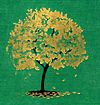Book Review
By Richard Dyer
"Raintree County"
by Ross Lockridge Jr.
Viking/Penguin, $18.95, 1050p
Paper ISBN: 014023666X
"Shade of the Raintree"
by Larry Lockridge
Viking/Penguin, $27.95h/$14.95p, 500p
Hardcover ISBN 0-670-85440-9
Paperback ISBN: 0140158715
Ross Lockridge
Jr. set out to write the Great American Novel. No one would attempt
such a thing anymore, but in "Raintree County" Lockridge
came closer to the goal that most aspirants have. In 1948, the
year of "The Naked and the Dead" and
"Other Voices, Other Rooms," "Raintree
County" became a best seller and a selection of
the Book-of-the-Month Club; it won a $150,000 award from MGM,
which a few years later filmed the novel with Montgomery Clift,
Elizabeth Taylor and Eva Marie Saint in the principal roles.
Lockridge never
saw the film; in 1948, in the first flush of an extraordinary
success, the 33-year-old novelist, happily married and the father
of four children, walked to the garage, attached a vacuum-cleaner
hose to the exhaust pipe of his Kaiser and committed suicide,
sitting bolt upright in the back seat.
Lockridge's
son Larry, who was only 5 in 1948, has now written an inquiry
into the life and death of his father, "Shade of the
Raintree," and Penguin has reissued "Raintree
County" in paperback.
Ten years after
its publication, I played sick for two days so I could stay home
from school to finish reading "Raintree County."
Today the faults and pretensions of the book are more apparent
than they were then - most of them are literary faults, the result
of overreaching ambition; on the other hand, the powerful currents
and depth of this great swollen river of a book remain irresistible.
"Raintree County" doesn't have to be the
great American novel to be an American classic and a classic
expression of the American dream; a time and place in our history
are made permanent in this book - this is the Indiana world of
Lockridge's grandparents.
It is clear
that "Shade of the Raintree" is also destined
to become an American classic on its own. It is a biography of
a compelling figure written with compelling urgency and depth
of feeling by a son seeking the father he never got the chance
to know. In seeking to understand his father, Lockridge sometimes
comes down very hard on his grandparents, but he does have a
real sense of how families work, and he has genuine compassion
for how people try to do their best in impossible situations.
Once again a Lockridge has permanently fixed through art and
imagination a time and place - the Indiana world of his own parents
and grandparents.
Ross Lockridge
Jr. was the son of a populist historian; his mother was a psychologist
who knew how to push the buttons she had installed in her son.
He graduated from Indiana University with the highest gradepoint
average ever established there, studied in Paris, went to Cambridge
to do graduate work at Harvard, taught at Simmons College, summered
on Cape Ann and married his undergraduate sweetheart, Vernice
Baker.
Like a runner
training for a marathon, Lockridge prepared himself thoroughly
for the mighty task of writing a great book. He had exhaustively
educated himself, reading comprehensively through American and
world fiction, philosophy and poetry. Before "Raintree
County," which ran to more than 2,000 pages, neatly
typed by Vernice, Lockridge had written and abandoned an epic
poem and another novel, both of comparable bulk; he bought 20,000
sheets of typing paper at a time.
Writing "Raintree
County" with small children in the house was the
staggering labor of seven years; it left Lockridge exhausted
and in a state of clinical depression, which manifested itself
first in a defensive correspondence with his publishers that
is extraordinary even in the context of other such emotionally
charged correspondence. Later the depression took the form of
despair over his work and a complete inability to contemplate
writing something else - in this he resembled Virginia Woolf,
who also battled clinical depression after she finished each
of her novels.
Like his cousin,
Mary Jane Ward, author of "The Snake Pit,"
Lockridge was hospitalized for mental illness and given electroshock
treatment; later it seemed easier to follow his mother's advice
and go to a Christian Science practitioner. Finally he felt he
had no other choice; he listened to a last basketball game on
the radio, and headed for the garage.
There is a
curious aspect to many of the photographs of Lockridge reproduced
in "Shade of the Raintree." He was a handsome,
charismatic man; women compared him to Tyrone Power. Everyone
else in the photos has a period look; Lockridge looks like a
modern actor in period costume, our contemporary. That is how
immediately he faces us in his son's generous-spirited biography.
Clinical depression
was as little understood in the 1940s as it is now; Lockridge's
psychological dilemma seems very contemporary, although, alas,
in the scope of Lockridge's ambition and his commitment to leaving
an imperishable gift to humanity through his work there is very
little of our time. The best thing about "Shade of the
Raintree" is that it sees nothing in idealism
to ridicule; Larry Lockridge can make us feel it the way his
father did.
© 1994 Richard Dyer

| The Novel | Essays | Other Writings | RL Jr. Writer's Award | Complete Contents | Book Orders |
| The Biography | Photos / Postcards | RC Source & Facsimiles | Suicide & Prevention | Movie & Score |
Page last updated: 25 January 1998